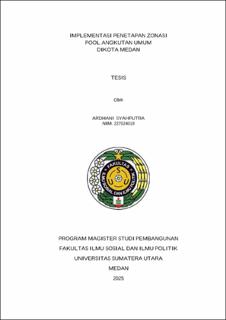| dc.description.abstract | The objective of this research is to analyze the implementation of the regulation of public ransportation pool zonation in Medan and to identify the inhibiting factors in the process of its implementation. The purpose of pool zonation is to create order in implementing public transportation in order not to cause traffic jams and disturbances in road function. In practice, however, there are still many public transportation pools which are not in accordance with the applicable regulation such as picking up and dropping off passengers outside a terminal and operating illegally. This research uses a qualitative approach with a descriptive method. The data are collected by conducting in-depth interviews, observation, and documenation. They are analyzed by refering to the implementation theory of public policy proposed by George C. Edward III which includes four main variables communication, resources, disposition, and bureaucratic structure. The result of the research suggests that the implementation of regulating public transportation pool zonation in Medan does not run optimally. Some factors which affect it, among others, are the lack of coordination among urgencies, the lack of human resources and facilities, the executors' attitude which does not support the policy, and the weakness of supervision on violations. Besides that, there are still many publie transporiation pools which are illegal, they pick up and drop off passengers outside terminals which beconmes the indicator of the ineflectiveness in implementing the policy. It is recommended that the Medan Municipality strengthen its supervision, do consistent regulation, and inerease socialization and synergy among stakeholders in order to ereate orderly and safe publie transportation system which is in accordance with regulations. | en_US |


